Italy national rugby union team
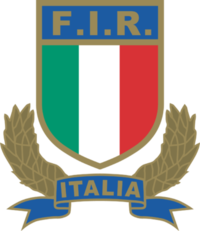 |
|||
| Union | Federazione Italiana Rugby | ||
|---|---|---|---|
| Nickname(s) | Azzurri (the Blues) | ||
| Ground(s) | Stadio Flaminio, San Siro | ||
| Coach(es) | |||
| Captain(s) | Sergio Parisse | ||
| Most caps | Alessandro Troncon (101) | ||
| Top scorer | Diego Dominguez (983) | ||
| Most tries | Marcello Cuttitta (25) | ||
|
|||
| First international | |||
(20 May 1929) |
|||
| Largest win | |||
(18 May 1994) |
|||
| Worst defeat | |||
(19 June 1999) |
|||
| World Cup | |||
| Appearances | 6 (First in 1987) | ||
| Best result | Two wins, 2003 and 2007 | ||
- For the rugby sevens side, see Italian national rugby union team (sevens)
The Italy national rugby union team represent the nation of Italy in the sport of rugby union. The team is also known as the Azzurri (the Blues). Italy have been playing international rugby since the late 1920s, and today are considered to be in the top tier of European rugby and compete annually in the Six Nations Championship with England, France, Ireland, Scotland and Wales.
Arguably, Italian Rugby really came to prominence in 2000 when it was added to the Five Nations, creating the Six Nations. Originally on the end of some heavy defeats, the side has grown in competitiveness, recorded a fourth place finish in 2007, and even in defeat, lop-sided losses are becoming far less frequent. Italy are ranked eleventh in the world by the IRB as of 17 March 2010.
Italy have also competed at every Rugby World Cup since the first tournament in 1987, but have yet to progress beyond the first round. Their best showing thus far has been in 2003 and 2007 where they managed two wins during the pool stages.
The current head coach is Nick Mallett. Number eight Sergio Parisse is their current captain.
Contents |
History
The first match played by an Italian XV was in 1911 between US Milanese and Voiron of France. On July 25 of the same year the "Propaganda Committee" was formed which in 1928 became the Federazione Italiana Rugby (FIR).
In May 1929, Italy played their first international losing 9-0 against Spain in Barcelona. After the formation of FIRA in 1934, which brought together the national teams of Italy, France, Spain, Czechoslovakia, Romania and Germany
Post-1945
The Second World War interrupted Italian rugby union, as it did in other rugby-playing nations. Post-war, there was a desire to return to normal and Italian rugby union entered a new dimension thanks to the help of Allied troops in Italy.
In the 1970s and 1980s rugby union made enormous progress thanks to great foreign players (John Kirwan, Naas Botha, David Campese, Michael Lynagh) and coaches (Julien Saby, Roy Bish, Greenwood, Nelie Smith) in the Italian championship. Even foreign coaches were and continue to be chosen for the national team, like Bertrande Fourcade and Georges Coste. In 1973, the national team went on a tour of South Africa, coached by ex-Springbok prop Amos Du Plooey. Tours of England and Scotland followed, as well as games against Australia and New Zealand, the masters of their day.
Since 1980, the Italian National side had been pursuing the ambition of playing in an expanded Five Nations Championship. Consistently good results against nations that now play in the European Nations Cup (Romania, Spain, Georgia, etc.), and the occasional win against the major nations such as France, Scotland, Wales and Ireland meant that they were often talked about as strong candidates.
The Azzurri took part in the first-ever Rugby World Cup match against New Zealand on 22 May 1987. The match proved a one-sided affair with New Zealand convincing 70-6 winners against a young Italian side. John Kirwan, later to become the Italian national coach, scored one of the tournament’s greatest-ever tries for the All Blacks. Italy did, however, manage to beat Fiji and finished third in their pool; failing to make the finals.
At the 1991 World Cup, Italy were grouped in a tough pool with the likes of England and the All Blacks. They lost both of these games but beat the USA. At the 1995 World Cup in South Africa, Italy came close to beating England; losing 20-27, but recovered to beat Argentina. They finished third in their pool again below England and Western Samoa, but above the Argentines.
The 1990s saw the Italians build a formidable side and record Test victories over Five Nations opposition. In 1996, a deal between British Sky Broadcasting and the Rugby Football Union meant that England home games were exclusively shown on Sky. England were threatened with being expelled from the Five Nations to be replaced by Italy. This threat was never carried out as a deal was worked out.
Italy recorded two consecutive victories over Ireland in 1997; on January 4, 37-29 at Lansdowne Road, and on December 20, 37-22 in Bologna. On March 22, 1997 they recorded their first and so far only win over France 40-32 (in Grenoble). In January 1998, Scotland were the victims with Italy winning 25-21 (in Treviso); in the same year in the Rugby World Cup Qualifiers, they narrowly lost 23-15 against England at Huddersfield, but they argued for a try by Alessandro Troncon disallowed by the referee.
At the 1999 World Cup, Italy were drawn with New Zealand for the third time and lost again. They did not win a single pool match and went home before the knock-out stage.
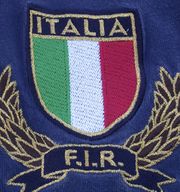
Six Nations
Italy finally joined the Six Nations Championship in 2000 but their admission coincided with the departure of some of their best players. Nevertheless they won their opening game against the reigning champions Scotland 34-20. Since then they have struggled to compete against the other nations and their participation was called into question, however they answered their critics by playing a more disciplined game. The 2001 and 2002 tournaments were particularly disappointing as they did not win a single game. Coach Brad Johnstone was sacked in 2002 after an alleged show of 'player power'.
John Kirwan was then appointed coach. Italy won two pool games at the 2003 World Cup, defeating both Canada and Tonga, but lost to the All Blacks and Wales. They managed to get their second Six Nations win in 2003 30-22 against Wales and Italy avoided the wooden spoon. They followed up by winning two games at the World Cup, another first, though the tournament was ultimately disappointing as the Welsh gained revenge with a 27-15 success that meant that Italy were the only Six Nations country not to advance to the knock-out stage. Their third win came against Scotland in 2004.
Most of the Italian national team play in club competitions in England and France, which, being at a higher standard to the Italian league allows the side to make consistent progression. However, this is not always seen through results and it will undoubtedly be a long time before they win their first Six Nations Championship. More and more Italians are coming to watch rugby union games and whereas before most of the fans at the Stadio Flaminio were away fans, now Italy has a good home crowd. One cause for optimism in Italian rugby is that their star players tend to be young and are likely to improve with time. Moreover, the budget of F.I.R. has grown impressively: currently €21 million is available.
Italy, along with other nations, had made good use of IRB rules which allowed them to select foreign born players if they had Italian ancestry or had lived in Italy for a qualifying period of 3 years. From 2004 they announced that they would only pick three such 'non-Italians' per team in order to develop their own domestic players.
In 2005 Italy finished bottom of the table again and failed to win a single game. Kirwan was sacked and replaced with Pierre Berbizier. Italy then went on a tour of Argentina where they surprised many by beating the Pumas 30-29 and drawing the series 1-1 (the only 2005 victory of a northern hemisphere team visiting a southern hemisphere team). However the Pumas had their revenge when they visited Genoa and beat Italy 39-22.
In the 2006 Six Nations Championship the Italian team performed strongly against every team, leading against both England and France in the first half, but lost their first three games. They did, however, get a creditable 18-18 draw away to Wales, their first ever away point in the tournament, and were unlucky not to draw with Scotland in Rome in the final game, losing 10-13 courtesy of a late Scottish penalty.
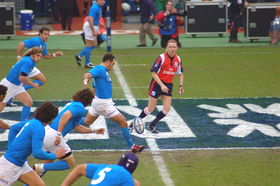
In the 2007 Six Nations Championship, Italy started poorly, losing to France 3-39. However, Italy's performance improved considerably, and they held reigning World champions England to a 20-7 result at Twickenham, with the Italian's Alessandro Troncon being named man of the match. Italy followed with a stunning start to their match at Murrayfield against Scotland, with Mauro Bergamasco scoring a try courtesy of a charged-down kick in the first minute, and Andrea Scanavacca and Kaine Robertson scoring interception tries within the next five. Scotland's shocking start gifted Italy a 21-0 lead after 7 minutes, and the Azzurri went on to record a 37-17 victory; their first-ever away win in the Six Nations. Italy's next match was against Wales in Rome. In a close match, Bergamasco scored a try in the last two minutes to give a winning score of 23-20, their second Six Nations victory over Wales, first consecutive victory in the competition and help them achieve their highest-ever position in the competition. However, the victory was not without controversy, as a last-minute penalty over the line by Wales was later deemed out of time by referee Chris White. Wales were told by White there was "10 seconds" remaining but as Wales kicked to touch, under the instruction of the TMO, White blew the whistle for full-time. They therefore could have taken a penalty kick to draw the game.
The domestic interest in rugby reached new heights with Italy's new success front page media coverage and the sport being held up as a model of fair play.[1] Media and public interest in the national team was very high during the side's new found success.[1] Despite losing their last game to Ireland, the headline on page one of the national sport newspaper La Gazzetta dello Sport read "To lose like this is beautiful," and 10,000 fans later greeted the national team at Rome's Piazza del Popolo.[1]
The 2008 Six Nations Championship saw the Italians again finish in last place, albeit by only a three point margin. They took part in close matches against Ireland, England and France respectively and managed a sole victory, defeating Scotland 23-20 in Rome in the last round of matches.[2]. In the summer tests they lost to South Africa but again managed to surprise 3rd ranked Argentina with a 13-12 victory. At the 2008 end of year spring tour Italy pushed the Wallabies all the way in their clash in Padova but the Australians eventually went on to win 30 points to 20. A week later the Italians were defeated by Argentina, 14-22. Since then the Italian team has dropped in the IRB World Rankings to 11th spot, behind Fiji.
Italy's 2009 Six Nations campaign was star-crossed almost from the beginning, with both specialist scrum-halves ruled out of the entire competition before a ball was kicked and a third alternative ruled out of the opener at England due to injury. Head coach Nick Mallett then decided to try Mauro Bergamasco, normally a flanker, at scrum-half. Mallett's gamble failed in epic fashion, with Bergamasco's mistakes leading to three England tries before he was replaced at the half; England went on to win 36–11. Bergamasco went back to flanker for the rest of the tournament. Italy finished in last place for the second straight year, this time without a single win; the Azzurri came within 20 points only once, in their 20–15 loss at the Flaminio to a Wales side resting many of its key players for the championship decider against Ireland.
In the 2010 Six Nations Championship, Italy were well beaten by Ireland before narrowly losing to England & defeating Scotland (both at home).
Strip
Italy play in blue jerseys; as of 2007, the strip is manufactured by Kappa and the Italian bank Cariparma (Cassa di Risparmio di Parma e Piacenza S.p.A.) is the shirt sponsor.
Record
Six Nations
Since entering the Six Nations Championship in 2000, Italy have yet to win the tournament. Italy got off to a positive start to the Six Nations in their first year; defeating Scotland in their first match of competition. Italy finished fifth in the 2003 competition above Wales. The following year Italy managed to finish fifth again, above Scotland in the final standings. In the 2007 Six Nations Italy defeated Scotland at Murrayfield for their first win away from home (Rome) in the competition. Two weeks later Italy defeated Wales for the second time in the history of the tournament in Rome: it was the first time the team won two games in the championship, and finished in 4th place. The winner of the Italy-France game is also awarded the Giuseppe Garibaldi Trophy.
England |
France |
Ireland |
Italy |
Scotland |
Wales |
|
|---|---|---|---|---|---|---|
| Tournaments | 110 | 80 | 110 | 11 | 110 | 110 |
| Outright Wins (Shared Wins) | ||||||
| Home Nations | 5 (4) | - | 4 (3) | - | 9 (2) | 7 (3) |
| Five Nations | 17 (6) | 12 (8) | 6 (5) | - | 5 (6) | 15 (8) |
| Six Nations | 3 | 5 | 1 | 0 | 0 | 2 |
| Overall | 25 (10) | 17 (8) | 11 (8) | 0 (0) | 14 (8) | 24 (11) |
| Grand Slams | 12 | 9 | 2 | 0 | 3 | 10 |
| Triple Crowns | 23 | N/A | 10 | N/A | 10 | 19 |
World Cup
Italy have competed at every Rugby World Cup since the competition's inception in 1987. Italy finished third in their pool at their first World Cup, defeating Fiji, but not making the finals. They did not make the finals in 1991, grouped in a tough pool with the likes of England and the All Blacks. At the 1995 World Cup in South Africa, they finished behind England and Western Samoa, but above Argentina in their pool.
In 1999 they did not make the finals, with their defeats to the All Blacks and Tonga. Italy won two pool games at the 2003 World Cup, defeating both Canada and Tonga, but lost to the All Blacks and Wales. Italy played the Rugby World Cup 2007 in Pool C, against New Zealand, Scotland, Romania and Portugal (who had been beaten 83-0 by Italy in the qualifiers) and had a very good chance of making the quarter finals for the first time. However, Italy were undone by indiscipline in the crucial group match against Scotland in St. Etienne. Chris Paterson kicked all of Scotland's points in an 18-16 victory, despite Italy crossing the line for the game's only try. Bortolussi missed a match-winning kick in an even contest that Scotland arguably deserved to win in the end.
European championships
Before 2000, Italy was one of the leading European teams outside the Five Nations, along with Romania and Georgia, and for a while the USSR.
Italy competed in the original European Championships from 1936–38, but the Second World War meant that the tournament would not resume until 1952. Italy then competed in these tournaments from 1952-2000.
| Team | First place | Second place | Third place |
| 1 | 9 | 8 |
Thirties wins
| Year | Host city | Winner | Second place | Third place |
|---|---|---|---|---|
| 1936 | Berlin | France |
Germany |
Italy |
| 1937 | Paris | France |
Italy |
Germany |
The fifties: the European Cup, Italian positions
| Year | Winner | Second place | Third place |
|---|---|---|---|
| 1952 | France |
Italy |
West Germany |
| 1954 | France |
Italy |
[[File:{{{flag alias-1939}}}|30x27px|border |alt=|link=]] Spain |
The Nations Cup 1966-1973
| Year | Winner | Second place | Third place |
|---|---|---|---|
| 1965/1966 | France |
Italy |
Romania |
| 1966/1967 | France |
Romania |
Italy |
| 1969/1970 | France |
Romania |
Italy |
The FIRA Trophy 1974-1997
| Year | Winner | Second place | Third place |
|---|---|---|---|
| 1974/1975 | Romania |
France |
Italy |
| 1975/1976 | France |
Italy |
Romania |
| 1976/1977 | Romania |
France |
Italy |
| 1979/1980 | France |
Romania |
Italy |
| 1981/1982 | France |
Italy |
Romania |
| 1982/1983 | Romania |
Italy |
Soviet Union |
| 1983/1984 | France |
Romania |
Italy |
| 1984/1985 | France |
Soviet Union |
Italy |
| 1990/1992 | France |
Italy |
Romania |
| 1992/1994 | France |
Italy |
Romania |
| 1995/1997 | Italy |
France |
Romania |
Players
Current squad
A 26-man squad for Italy's tour of South Africa.[3] Josh Sole and Matías Agüero were ruled out due to injury, they were replaced by Bernabò and Sbaraglini.[4] Mauro Bergamasco also pulled out, being replaced by Simone Favaro.[5]
- Caps updated before test matches.
Head Coach: Nick Mallett
|
Notable players
|
|
Former Coaches
 Pierre Villepreux 1978-1981
Pierre Villepreux 1978-1981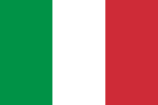 Paolo Paladini - Marco Pulli 1981-1985
Paolo Paladini - Marco Pulli 1981-1985 Marco Bollesan 1985-1988
Marco Bollesan 1985-1988 Loreto Cucchiarelli 1988-1989
Loreto Cucchiarelli 1988-1989 Bertrand Fourcade 1989-1993
Bertrand Fourcade 1989-1993 Georges Coste 1993-1999
Georges Coste 1993-1999 Massimo Mascioletti 1999-2000
Massimo Mascioletti 1999-2000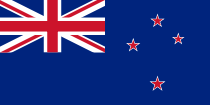 Brad Johnstone 2000-2002
Brad Johnstone 2000-2002 John Kirwan 2002-2005
John Kirwan 2002-2005 Pierre Berbizier 2005-2007
Pierre Berbizier 2005-2007
Individual records
- Most selections:
- Alessandro Troncon - 101
- Carlo Checchinato - 82
- Andrea Lo Cicero - 78
- Most tries:
- Marcello Cuttitta - 25
- Paolo Vaccari - 22
- Carlo Checchinato - 21
- Most points:
- Diego Dominguez - 983
- Stefano Bettarello - 483
- Luigi Troiani - 294
See also
- Italy at the team sports international competitions
- Rugby union in Italy
- Super 10
- Giuseppe Garibaldi Trophy
References
- ↑ 1.0 1.1 1.2 "Italy salute Rugby heroes". Euro Sport. http://www.eurosport.com/rugby/six-nations/2007/sport_sto1121056.shtml. Retrieved 21 March 2007.
- ↑ Official RBS 6 Nations Rugby : Championship - Fixtures & Results
- ↑ "Parisse back to skipper Italy!". PlanetRugby.com. 2010-05-17. http://www.planetrugby.com/story/0,25883,16024_6159722,00.html. Retrieved 2010-05-17.
- ↑ "Rugby-Sole and Aguero ruled out of Italy trip to South Africa". Eurosport.Yahoo.com. 2010-06-01. http://uk.eurosport.yahoo.com/01062010/2/rugby-sole-aguero-ruled-italy-trip-south-africa.html. Retrieved 2010-06-04.
- ↑ "Bergamasco out of South Africa tour". PlanetRugby.com. 2010-06-05. http://www.planetrugby.com/story/0,25883,3551_6192476,00.html. Retrieved 2010-06-05.
External links
External links
- Federazione Italiana Rugby official site
- Italian rugby union news from Planet Rugby
- Italian Rugby Friends
- World Cup Preview
|
||||||||||||||
|
||||||||||||||||||||
|
||||||||||||||||||||
|
||||||||||||||||||||||||||||||||
|
||||||||||||||||||||||||||
|
|||||